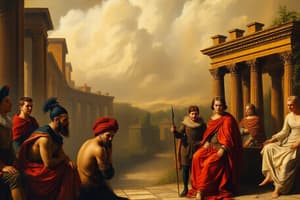Podcast
Questions and Answers
What was a primary characteristic of Roman citizenship?
What was a primary characteristic of Roman citizenship?
- It was exclusively for the wealthy elite.
- It only applied to inhabitants of Italy.
- It was automatically granted at birth to all residents.
- It was a status that could be earned and conferred. (correct)
Which of the following was a responsibility of Roman citizens?
Which of the following was a responsibility of Roman citizens?
- Participation in tax payments. (correct)
- Ability to travel freely without documentation.
- The right to live outside the empire without restrictions.
- Exemption from military service.
What distinguished Roman citizens from non-citizens in terms of legal treatment?
What distinguished Roman citizens from non-citizens in terms of legal treatment?
- Non-citizens had more rights in legal proceedings.
- Citizens were immune from all legal consequences.
- Citizens could be punished with greater severity.
- Certain legal protections were exclusive to citizens. (correct)
How did Rome integrate various regions into its empire through citizenship?
How did Rome integrate various regions into its empire through citizenship?
In what situation did Apostle Paul utilize his Roman citizenship?
In what situation did Apostle Paul utilize his Roman citizenship?
Which of the following statements about Roman citizenship is false?
Which of the following statements about Roman citizenship is false?
What was one of the key roles of Roman citizenship in maintaining the empire?
What was one of the key roles of Roman citizenship in maintaining the empire?
What was one consequence of being a Roman citizen?
What was one consequence of being a Roman citizen?
What is considered one of the standout rights enjoyed by Roman citizens?
What is considered one of the standout rights enjoyed by Roman citizens?
Which of the following is a principle that modern legal systems inherited from Roman law?
Which of the following is a principle that modern legal systems inherited from Roman law?
What was the primary challenge the Roman Empire faced regarding governance?
What was the primary challenge the Roman Empire faced regarding governance?
Which document is most famous for its codification of Roman law?
Which document is most famous for its codification of Roman law?
How did Roman citizenship contribute to the stability of the Empire?
How did Roman citizenship contribute to the stability of the Empire?
In which area did Roman law NOT have a significant influence?
In which area did Roman law NOT have a significant influence?
What aspect of Roman law reflects the complexity of life in the empire?
What aspect of Roman law reflects the complexity of life in the empire?
Which characteristic did the Roman legal system share with modern legal frameworks?
Which characteristic did the Roman legal system share with modern legal frameworks?
Flashcards are hidden until you start studying
Study Notes
Roman Empire Overview
- The Roman Empire was a vast entity stretching across Europe, Asia, and Africa, representing human achievements in governance, culture, and engineering.
- It was synonymous with power and sophistication for centuries, underpinning its ability to manage diverse territories.
Roman Citizenship
- Roman citizenship was a prized status that conferred various privileges and could be acquired, not solely inherited.
- Initially exclusive to Rome's inhabitants, citizenship expanded to include people across the empire for integration and rewards.
- Citizens had rights to vote, legal protections, and eligibility for public office, distinguishing them from non-citizens.
- Responsibilities attached to citizenship included paying taxes, military service, and civic participation, reinforcing commitment to the empire.
- The Apostle Paul’s declaration of citizenship highlights its power and respect, offering protection against mistreatment.
Roman Law
- Roman law significantly influenced subsequent legal systems, characterized by a comprehensive collection of statutes, principles, and precedents.
- Key areas covered included property rights, personal offenses, and societal norms, reflecting the empire's complexities.
- Laws were documented in various codes, notably the Twelve Tables, symbolizing the legal framework's foundational role.
- Among citizens’ rights, the right to a fair trial is pivotal, establishing that punishment could not occur without due process and allowing the right to appeal verdicts.
Modern Legal Influences
- Many aspects of contemporary legal systems trace roots to Roman law, including principles like 'innocent until proven guilty' and the structure of legal codes.
- The organization and documentation of legal statutes evolved from Roman precedents, showcasing its enduring legacy.
Unity Through Citizenship and Law
- The diversity of the Roman Empire created challenges in maintaining unity and accommodating various cultures and traditions.
- Governing diverse regions required a delicate balance of uniformity and flexibility to prevent resentment among different groups.
- Roman citizenship provided a common identity with standardized rights and responsibilities, fostering unity across diverse backgrounds.
Studying That Suits You
Use AI to generate personalized quizzes and flashcards to suit your learning preferences.



